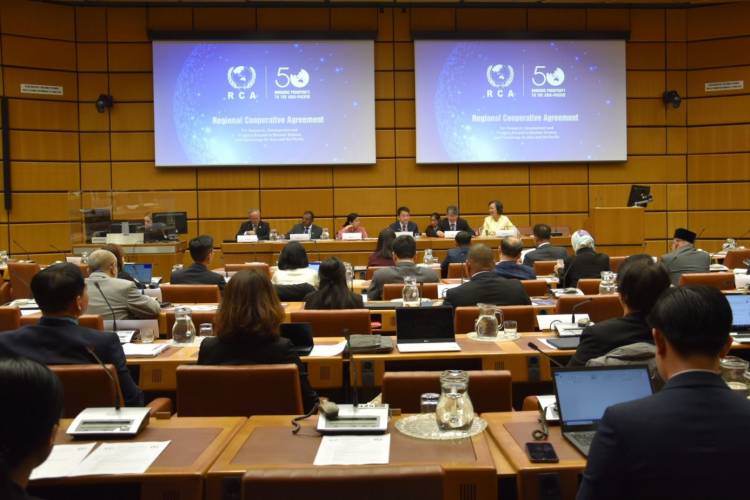Attendees at an event to mark the 50th anniversary of the Regional Cooperative Agreement for Research, Development and Training Related to Nuclear Science and Technology for Asia and the Pacific (RCA) heard IAEA Director General Rafael Grossi describe the Agreement as a “beautiful example of cooperation that is based on the desire to improve the lives of people in this region.”
With IAEA support, the RCA has successfully promoted human resource development in the region for the past five decades. More than 170 RCA projects have enabled training for 10,000 counterparts through over 650 regional training courses. In addition, more than 4,500 experts and lecturers have been recruited to provide expertise, experience and skills for the safe, effective and efficient use of nuclear technology in support of sustainable development.
Held on the margins of the IAEA’s 66th General Conference to mark the 50th Anniversary of the RCA’s founding, the first-ever RCA Ministerial-Level Meeting provided a unique opportunity to reflect on these and other accomplishments. To recognize particularly outstanding achievements, an awards ceremony convened by the RCA Chair, Tran Chi Thanh from Viet Nam, honoured the contributions of individuals and institutions. Twenty-eight awards were presented to recipients from 12 countries, each recipient nominated by RCA State Parties based upon their long-term commitment and support to the RCA programme.
“These major achievements and success stories can serve as strong examples of regional cohesion and cooperation, and we must take lessons learned from the past fifty years to strive to build on our successes,” said Hua Liu, Deputy Director General and Head of the Department of Technical Cooperation, speaking at the award ceremony.
At the Ministerial-Level Meeting, RCA State Parties reinforced their commitment to the IAEA’s technical cooperation programme, through the adoption of a Joint Declaration. The Declaration reaffirms the vital role of the RCA in facilitating the peaceful application of nuclear science and technology, contributing to addressing regional challenges and enhancing the socio-economic wellbeing of the region. In addition to underscoring the continued importance of the 50-year-old agreement, the Joint Declaration sets out future priorities, including expanding membership in the region and strengthening partnerships to ensure far-reaching success.
Also during the week of the IAEA General Conference, a meeting of RCA national representatives provided a platform to determine future regional priorities for the Agreement. State Parties heard how the RCA Medium Term Strategy for 2024-2029 is being drafted by a working group based on lessons learned from the previous iteration.
Representatives also discussed the outcomes of a feasibility study focused on a potential RCA scholarship programme in nuclear-related fields that could build regional capacity of highly qualified human resources through master’s degree programmes. On behalf of Viet Nam, which holds the current RCA Chairpersonship, Minister of Science and Technology Huynh Thanh Dat underscored the key role of human resources in the success of any scientific or nuclear programme. “We are living in a time where we have many critical problems that pose an issue to future development, so we need more human resources,” he said.
The scholarship programme under discussion would expand on existing IAEA support, with the aim of reaching around 1,000 RCA awardees by 2032. In Asia and the Pacific, many countries have already established postgraduate education scholarship programmes in a broad range of nuclear-related disciplines, in addition to the IAEA’s Marie Sklodowska-Curie Fellowship Programme, which sponsors around 100 women students per year.
As the first of the IAEA’s regional agreements, the RCA has grown from a ground-breaking initiative to a catalyst for development in the region. “The RCA has 50 years of experience, let us commit for another 50 years and for generations to come,” IAEA Director General Rafael Grossi said.
History of the RCA
The RCA was founded in 1972 under the auspices of the IAEA to promote regional cooperation in the peaceful uses of nuclear science and technology to address regional challenges through research and development.
There are now 22 State Parties to the RCA Agreement: Australia, Bangladesh, Cambodia, China, Fiji, India, Indonesia, Japan, Republic of Korea, Laos, Malaysia, Mongolia, Myanmar, Nepal, New Zealand, Pakistan, Palau, Philippines, Singapore, Sri Lanka, Thailand and Viet Nam.
The next bi-annual meeting of National RCA Representatives will take place in Australia in 2023.







